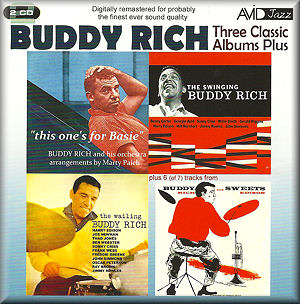CD1
The Wailing Buddy Rich
1. The Monster
2. Sunday
3. A Smooth One
4. Broadway
Buddy Rich - Drums
Thad Jones, Joe Newman - Trumpets (tracks 1, 2)
Ben Webster, Frank Wess - Tenor saxes (Tracks 1, 2)
Oscar Peterson - Piano (tracks 1, 2)
Freddie Green - Guitar (tracks 1, 2)
Ray Brown - Bass (tracks 1, 2)
Harry Edison - Trumpet (tracks 3, 4)
Sonny Criss - Alto sax (tracks 3, 4)
Jimmy Rowles - Piano (tracks 3, 4)
John Simmons - Bass (tracks 3, 4)
The Swinging Buddy Rich
5. Let's Fall In Love
6. Me And My Jaguar
7. Just Blues
8. Sweets' Opus No.1
9. Strike It Rich
10. Sportin' Life
11. Sonny And Sweets
12. The Two Mothers
Buddy Rich - Drums
Harry Edison - Trumpet (tracks 5-12)
Milt Bernhart - Trombone (tracks 5-10)
Benny Carter - Alto sax (tracks 5-7)
Georgie Auld - Tenor sax (tracks 5-7)
Bob Lawson - Baritone sax (tracks 5-7)
Jimmy Rowles - Piano (tracks 5-7, 11, 12)
John Simmons - Bass (tracks 5-7, 11, 12)
Willie Smith - Alto sax (tracks 8-10)
Tom Brown - Tenor sax (tracks 8-10)
Bob Poland - Baritone sax (tracks 8-10)
Gerald Wiggins - Piano (tracks 8-10)
Joe Comfort - Bass (tracks 8-10)
Sonny Criss - Alto sax (tracks 11, 12)
CD2
The Swinging Buddy Rich
1. Willow Weep For Me
Buddy and Sweets
2. The Yellow Rose Of Brooklyn
3. All Sweets
4. Nice Work If You Can Get It
5. Barney's Bugle
6. Now's The Time
7. You're Getting To Be A Habit With Me
Buddy Rich - Drums
Harry Edison - Trumpet
Jimmy Rowles - Piano
Barney Kessel - Guitar
John Simmons - Bass
This One's For Basie
8. Blue And Sentimental
9. Down For Double
10. Jump For Me
11. Blues For Basie
12. Jumpin' At The Woodside
13. Ain't It The Truth
14. Shorty George
15. 9.20 Special
Buddy Rich - Drums
Conrad Goazo, Pete Condoli, Harry Edison - Trumpets
Frank, Rosolino - Trombone
Bob Enevoldsen - Valve trombone, tenor sax
Bob Cooper - Tenor sax
Buddy Collette - Tenor sax, baritone sax, flute
Jimmy Rowles - Piano
Bill Pitman - Guitar
Joe Mondragon - Bass
The Wailing Buddy Rich consists of two tracks each from two different sessions - recorded respectively in May and August 1955. The first two tracks can hardly fail with a rhythm section of Oscar Peterson, Ray Brown and Buddy Rich plus Count Basie's guitarist Freddie Green. These four men provide an ongoing pulse which seems unstoppable. Early on in The Monster, Buddy swaps fours with Oscar, a real rhythmic treat. Buddy's solo later in this track tends to go on a bit too long, although it does show his expertise on the bass drum, played at an unbelievably fast beat. Sunday turns down the heat with a nice relaxed bounce. Ben Webster's playing on these first two tracks is irresistible.
The next two tracks match Buddy Rich with four different musicians, including Harry Edison, whose style seems to fit this sort of session. Edison plays both tunes muted, using some of his favourite phrases. Altoist Sonny Criss supplies some of his bebop soloing, which doesn't seem out of place in this easy-going set. Buddy gets to solo with brushes in Broadway.
The Swinging Buddy Rich consists of tracks from four different sessions recorded between 1953 and 1955. Most tracks seem to be more arranged than on the previous LP, but Buddy gets plenty of chances to solo, as does Harry Edison. Buddy's solo on Strike It Rich lasts for nearly five minutes and reveals to the attentive listener how much he depended on the single-stroke roll as a basis for his solos. In a way, the brilliant brushwork and judicious dynamics in his solo on The Two Mothers are greater causes for admiration.
Buddy and Sweets is a 1955 album that put together two musicians who admired one another: Buddy Rich and Harry Edison. Both men regarded swing as a prime ingredient in jazz, and they display this interest to the full. The Yellow Rose of Brooklyn is a showpiece for Buddy on the tomtoms. All Sweets sounds suspiciously like another tune and its speed forces Edison to play lots of repeated notes which don't make for interesting solos. Nice Work If You Can Get It is much better because of the easier tempo, which suits Edison and also Barney Kessel, who adds considerably to this session with his solos and comping. You're Getting To Be A Habit With Me is taken at an unusually slow tempo which allows Harry Edison to show his lyrical side.
This One's For Basie, recorded in 1956, is self-explanatory, with Buddy Rich behind a fairly large ensemble playing tunes mostly associated with Count Basie. Marty Paich wrote the arrangements for this group of West-coast musicians. They don't try to replicate the Basie sound but they pay tribute to Bill Basie in the best way possible - musically. Blue And Sentimental opens with a lovely flute solo from Buddy Collette, and Down For Double lets Buddy push the band along as well as soloing with his usual energy. You can tell when Harry Edison is soloing, as he often repeats the riff from Plaid, which he recorded at a memorable Norman Granz session. But his muted solo in Blues For Basie is beautiful. In Jump For Me, Jimmy Rowles actually reproduces Count Basie's minimal piano style.
The album title may mislead, as buyers actually get the best part of four albums, with only Easy Does It omitted from the Buddy and Sweets LP. One drawback is that the sleeve-notes are printed in a different order from the actual order of the music. But one can hardly complain when given such a cornucopia of music at a super budget price.
Tony Augarde
www.augardebooks.co.uk
